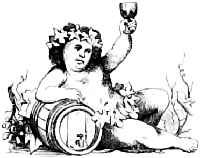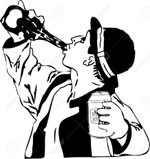|
A Close Call on the Hayward Turn
|
 |
|
Back in the late 1970's I made a few runs as a young brakeman on Southern Pacific's nighttime Hayward Turn, an out-and-back local freight that ran between Bayshore Yard in San Francisco over the Dumbarton Bridge to the train's namesake city in the East Bay. Generally, it wasn't a bad job, except for the hours. The regular Hayward station telegrapher / agent always seemed to have a pot of coffee waiting for us, however. One night, things did not go well. Those were the days before drug and alcohol testing, and that night my fellow engineer and firemen decided to take full advantage of the situation, and incidentally scare me to death. The trip went fine until we got stuck at Niles on our return journey to Bayshore. It seems that the "Bullet" (a fine, unhurried, engineer who does not deserve to have his actual name mentioned in context with the bozos that we are talking about here) was having difficulty picking-up his cars and departing San Jose Yard, a long way off. Why we were held at Niles did not make sense to us, but the tower operator told us it might be a long wait. Upon hearing this, the engineer and fireman headed for the liquor store across the street from Niles depot, but only after each had smoked a bowl of hash. They came back with with a pint of brandy and a six pack of beer each. To insure that I was not a 'narc', the fireman tossed me a beer, as I fled to the second unit to escape the festivities. I drank it, but regretted it soon on. When we finally were about to move, I returned to the lead unit to find that the engine crew was three sheets to the wind. I could barely understand their slobbering speech. As we began down the Centerville Line, the Newark Tower operator called to inform us that we were supposed to pick up some cars of of "The Rickwell" (no idea what the track was named after). The engineer immediately got petulant and nasty, and began to slur a radio argument with with the nonplussed operator. Back on the caboose, the conductor who was usually a good head, remained mute. We stopped at the tower and the engineer staggered off to chew on the dispatcher over the phone, but the operator blocked his way and convinced him he would fix things with the dispatcher. Though most of us hated working with drunks, nobody but nobody would ever give a thought to turning-in one. A stool pigeon was considered to be several orders of magnitude more reprehensible than a lush. As we headed towards the Dumbarton Bridge, usually a delightful segment of any journey, things got worse. At about the entrance to the drawbridge, the engineer, who had been unsteady in his seat, gave a low moan and collapsed onto the floor. The barely conscious fireman stumbled over to the engineers chair, but passed out and tumbled onto the engineer in short order. I was a recent hire who had no idea about how to operate any of those mysterious controls. All I knew was two things. First, we wood soon approach Redwood Junction Tower, where the operator probably would stop us in favor of the first early morning plug (commute train). Second I COULD stop the train using that big red emergency valve located on the wall in front of me, but given that we were not going very fast, that action could lock-up the wheels on the empty cars, causing anything from a rough stop and battered caboose crew, to a break-in-two, to a derailment. I soon found that the signals at Redwood Junction would allow us to proceed, but we were still going too fast to make it through the junction switches without going into the ditch, so I was still confronted with a need to plug (place into emergency) the train. At the last possible moment, providence intervened: the engineer woke up, rolled the firemen off him, and slightly refreshed, ran the train back to the yard without incident. I thought that I was off the hook as we passed the Visitation-end switchmen's shanty, but oh NO! The engineer and the fireman, who now was semi-conscious himself, got a case of the giggles. The engineer decided that it would be fun to big hole (plug) the train at yard speed, just for the heck of it, to the rousing encouragement of his assistant. PLOWEE, we came to a stop. I thought for sure that the train had derailed and the rear end crew was dead, but lo, the air recovered and the train continued down the yard track, but not without another PLOWEE. Somehow we made it, and as I walked-scared towards the locker room door, I had visions of the conductor and rear brakeman sprawled on the caboose floor with bashed-in heads. But there they were as I opened the door, looking up at me with bemused, quizzical eyes. How had they escaped death on the caboose, I immediately asked. The conductor smiled and related that they had both stepped off of the moving caboose an instant before the first PLOWEE. Thank God! They allowed that the general state of inebriation on the head end was quite evident to them, but noting that I was sober, and looked like I had been through the wringer, nothing more was said. The conductor never explained his inaction at Newark. He was well-known for his own love of the sauce. There is nothing like a frightening incident to keep you on the straight and narrow throughout your career. I did have an occasional beer while on duty in the coming years, but I was never close to being drunk. I'm not proud of this, but I can take some satisfaction that I NEVER ran a train as an engineer with the slightest bit of alcohol in my veins, even though I was hardly a tee-totaler in my off hours. Grave responsibility causes most, but not all of us to grow up, I guess.
|
|

 home
home